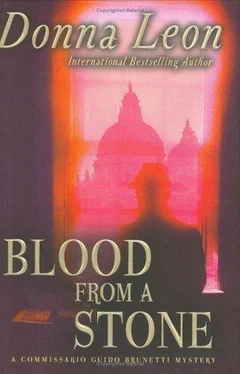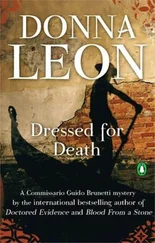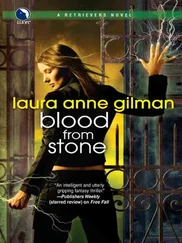Donna Leon - Blood from a stone
Здесь есть возможность читать онлайн «Donna Leon - Blood from a stone» весь текст электронной книги совершенно бесплатно (целиком полную версию без сокращений). В некоторых случаях можно слушать аудио, скачать через торрент в формате fb2 и присутствует краткое содержание. Год выпуска: 2005, Жанр: Детектив, на русском языке. Описание произведения, (предисловие) а так же отзывы посетителей доступны на портале библиотеки ЛибКат.
- Название:Blood from a stone
- Автор:
- Жанр:
- Год:2005
- ISBN:нет данных
- Рейтинг книги:4 / 5. Голосов: 1
-
Избранное:Добавить в избранное
- Отзывы:
-
Ваша оценка:
- 80
- 1
- 2
- 3
- 4
- 5
Blood from a stone: краткое содержание, описание и аннотация
Предлагаем к чтению аннотацию, описание, краткое содержание или предисловие (зависит от того, что написал сам автор книги «Blood from a stone»). Если вы не нашли необходимую информацию о книге — напишите в комментариях, мы постараемся отыскать её.
Blood from a stone — читать онлайн бесплатно полную книгу (весь текст) целиком
Ниже представлен текст книги, разбитый по страницам. Система сохранения места последней прочитанной страницы, позволяет с удобством читать онлайн бесплатно книгу «Blood from a stone», без необходимости каждый раз заново искать на чём Вы остановились. Поставьте закладку, и сможете в любой момент перейти на страницу, на которой закончили чтение.
Интервал:
Закладка:
She gave him a questioning glance, and he elaborated, ‘To know which way to leave. Also to know where he was.’
‘Does that mean Venetian?’
Brunetti shook his head. ‘I’ve never heard of a Venetian who works as a killer.’
Paola considered this and then said, ‘It wouldn’t take all that long to learn at least that much about the city. Some of the Africans are pretty much always there, in Santo Stefano, so all they’d have to do is walk around for a day or so to find them. Or ask someone.’ She closed her eyes and considered the geography of the area and finally said, ‘Afterwards, getting away would be easy. All they’d have to do is go back towards Rialto, or up towards San Marco, or over the Accademia.’
When she stopped, Brunetti continued, ‘Or they could go into San Vidal and then cut back towards San Samuele.’
‘How many places could they get a vaporetto?’ she asked.
‘Three. Four. And then they could have gone either way.’
‘What would you do?’ she asked.
‘I don’t know. But if I wanted to leave the city, I’d probably go up towards San Marco and cut in towards the Fenice and then to Rialto.’
‘Did anyone see them?’
‘An American tourist. She saw one of them, said he was a man about my age and size, wearing an overcoat, a scarf, and a hat.’
‘Half the city,’ Paola said. ‘Anything else?’
‘That there were other people from her group there and they might have seen something. I’m going to talk to them tomorrow morning.’
‘How early?’
‘Early. I have to leave here before eight.’
She leaned forward and poured him another small glass of grappa. ‘American tourists at eight in the morning. Here, take this: it’s the least you deserve.’
5
The morning dawned unpleasantly. A thick mist hung suspended in the air, eager to cling to anything that passed through it. By the time Brunetti got to the imbarcadero of the Numero Uno, the shoulders of his overcoat were covered by a thin film of droplets, and he pulled in dampness with every breath. The approaching vaporetto slipped silently from fog so thick Brunetti could barely make out the form of the man waiting to moor it and slide back the metal gate. He stepped on board, looked up and saw its radar screen turning, and wondered what it was like out on the laguna .
He took a seat in the cabin and opened that morning’s Gazzettino , but he learned from it considerably less than he had the night before. In possession of few facts, the writer opted for sentiment and spoke of the terrible cost the extracomunitari had to pay for their desire for a chance at bare survival and to earn enough money to send back to their families. No name was given for the dead man, nor was his nationality known, though it was assumed he was from Senegal, the country from which most of the ambulanti came. An elderly man got on at Sant’ Angelo and chose to sit next to Brunetti. He saw the newspaper and mouthed out the headline, then said, ‘Nothing but trouble once you start letting them in.’
Brunetti ignored him.
Brunetti’s silence spurred the man to add, ‘I’d round them up and send them back.’
Brunetti gave a grunt and turned the page, but the old man failed to take the hint. ‘My son-in-law has a shop in Calle dei Fabbri. Pays his rent, pays his help, pays his taxes. He gives something to the city, gives work. And these people,’ he said, making a gesture that stopped just short of slapping the offending page, ‘what do they give us?’
With another grunt, Brunetti folded his newspaper and excused himself to go and stand on deck, though they were only at Santa Maria del Giglio and he had another two stops before he got off.
The Paganelli was a narrow hotel, slipped in, like an architectural dash separating two capital letters, between the Danieli and the Savoia amp; Jolanda. At the desk he said he was there to meet the Doctors Crowley and was told they were already in the breakfast room. He followed the clerk’s gesture down a narrow corridor and entered a small room that held six or seven tables, at one of which the Crowleys sat. With them were another elderly couple and, between them, a woman whose appearance gave evidence of considerable assistance.
When Doctor Crowley saw Brunetti, he got to his feet and waved at him; his wife looked up and smiled a greeting. The other man at the table rose and stayed standing as Brunetti approached. One of the women smiled in Brunetti’s direction; the other did not.
The people presented to him as the Petersons were tiny, bird-like people, dressed in colours as inconspicuous as those of sparrows. She had iron grey hair that capped her head in a tight perm; he was entirely bald, his head covered with deep, sun-hardened furrows running from front to back. The woman who had not smiled, introduced as Lydia Watts, had lustrous red hair and lips the same colour. Brunetti saw her push back a vagrant curl with a hand that no surgery and no art could make look the same age as her face and hair.
The table was covered with the aftermath of breakfast: coffee cups and teapots and fragments of buttered rolls. There were two empty bread baskets and an equally empty platter that might have held meat or cheese.
After Brunetti shook hands with all of them, Dr Crowley pulled over a chair from a neighbouring table and offered it to Brunetti. He sat and when the doctor did too, looked around the table at the assembled Americans. ‘I’m grateful that you agreed to speak to me this morning,’ he said in English.
Dottoressa Crowley answered, ‘It’s only right, isn’t it, to tell you what we saw, if it can help?’ There were nods of agreement from the others.
Her husband took over from her and said, ‘We’ve been talking about it already this morning, Commissario.’ With a gesture that encompassed all of the people at the table, he added, ‘It’s probably best that we each tell you what we saw.’
Dr Peterson cleared his throat a few times, then said, speaking with the sort of clarity that comes of the fear that a foreigner might not otherwise understand, ‘Well, after we got down into that place you call a campo , we were standing sort of in the front, to the left of Fred and Martha, and I was looking down at the purses those fellows were selling. And a man, not the one Martha saw — guy about my height — he moved forward until he was standing just a little bit behind me. He was on my left, but I really didn’t pay any attention to him because, as I said, I was looking at the purses. Then I heard the noise, sort of a zip zip — I didn’t have any idea what it was — sounded like a staple gun or something, or that thing they use when they take your tyres off — and there was the music from behind us, too — and then this guy stepped back without looking where he was going, and then he was gone. I didn’t think anything of it except that I didn’t like the way he pushed back like that, right into the people behind him.
‘Next thing you know, I looked back and I saw that the guy who was selling the purses, he was down on the ground. And then Martha was kneeling beside him, and then Fred, and then they said he was dead.’ He looked at Brunetti, and around at the others.
‘I never saw anything like it in my life,’ Dr Peterson continued, with what began to sound like indignation, as though he thought Brunetti owed him an explanation. He continued: ‘Well, we waited around for a while, I’d say about a half-hour, but nothing happened. No one came. And it was awful cold and we hadn’t had our supper yet, so we came back here to the hotel.’
A waiter passed by their table, and Dr Peterson took his attention away from Brunetti long enough to ask for another pot of coffee. The waiter nodded, noticed Brunetti sitting with them, and asked if he would like un caffè , a question which seemed to confuse the Americans as much as it relieved Brunetti. He had been in America and knew the difference between coffee and caffè .
Читать дальшеИнтервал:
Закладка:
Похожие книги на «Blood from a stone»
Представляем Вашему вниманию похожие книги на «Blood from a stone» списком для выбора. Мы отобрали схожую по названию и смыслу литературу в надежде предоставить читателям больше вариантов отыскать новые, интересные, ещё непрочитанные произведения.
Обсуждение, отзывы о книге «Blood from a stone» и просто собственные мнения читателей. Оставьте ваши комментарии, напишите, что Вы думаете о произведении, его смысле или главных героях. Укажите что конкретно понравилось, а что нет, и почему Вы так считаете.












